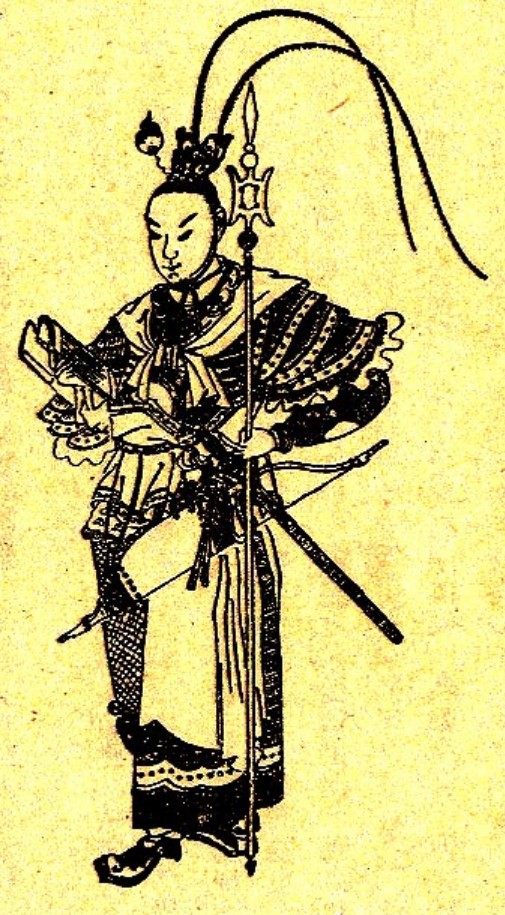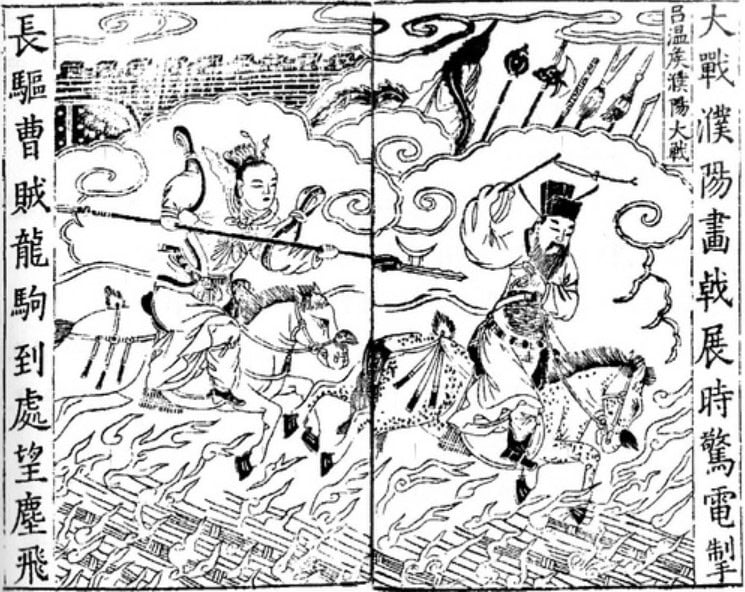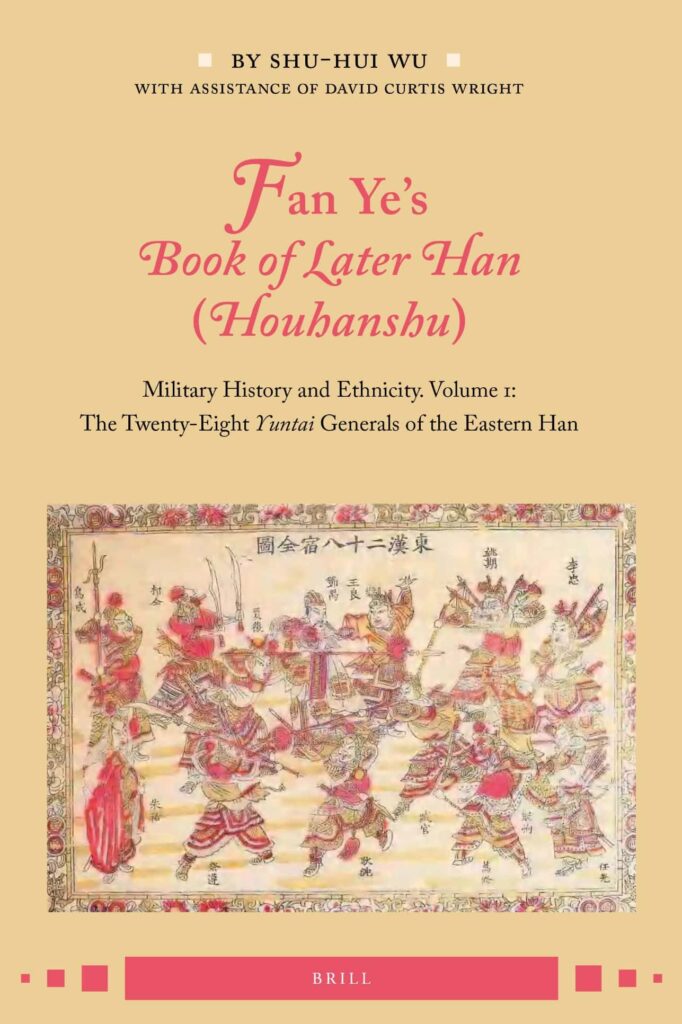Lu Bu
TLDR: Lu Bu, a legendary warrior of the late Eastern Han dynasty, was known for his unmatched combat skills, tumultuous alliances, and dramatic downfall.
You know, when I first heard about Lu Bu, I was absolutely blown away. This guy from the late Eastern Han dynasty was like a real-life superhero – or maybe supervillain, depending on how you look at it. I mean, imagine a warrior so fierce that he was called the “Flying General” and was said to be worth a thousand men on the battlefield. Lu Bu wasn’t just a military genius; he was a complex character with a knack for political intrigue and a reputation for being unbeatable in combat. From his humble beginnings to his dramatic downfall, Lu Bu’s life story reads like an epic saga that keeps you on the edge of your seat.
Early Life of Lu Bu
Lu Bu, one of the most formidable warriors in Chinese history, was born in Jiuyuan, located in the Wuyuan Commandery of what is now modern-day Baotou, Inner Mongolia. While his exact birth date remains unknown, it’s estimated that he was born in the 150s AD during the late Eastern Han dynasty.
Lu Bu’s early life was shaped by the frontier environment of his birthplace. Growing up in this region, he developed exceptional skills in archery and horsemanship from a young age. These abilities would later contribute to his reputation as an unparalleled warrior.
Lu Bu’s initial military training likely began in his youth, focusing on:
- Physical conditioning
- Weapons proficiency
- Tactical awareness
- Horseback riding
As a young man, Lu Bu joined the Bing Province garrison as a foot soldier, where he continued to hone his combat skills. His exceptional prowess on the battlefield soon caught the attention of Ding Yuan, the prefect of Bing Province, who appointed Lu Bu as his Chief Secretary in 188 AD.
| Aspect of Lu Bu’s Early Life | Details |
| Birthplace | Jiuyuan, Wuyuan Commandery |
| Estimated Birth Period | 150s AD |
| Initial Military Role | Foot soldier in Bing Province garrison |
| First Significant Appointment | Chief Secretary to Ding Yuan (188 AD) |
Lu Bu’s rapid rise from a common soldier to a trusted position under Ding Yuan demonstrates his extraordinary abilities and ambition. This early period of his life laid the foundation for his future as a feared warrior and complex historical figure.
Lu Bu’s Military Career
Lu Bu’s military career was marked by rapid advancement, impressive victories, and a series of shifting alliances. He began his service in the Bing Province garrison as a foot soldier, quickly distinguishing himself through his exceptional combat skills. His prowess caught the attention of Ding Yuan, the prefect of Bing Province, who appointed Lu Bu as his Chief Secretary in 188 AD.
Lu Bu’s rise through the ranks accelerated when he aligned himself with the powerful minister Dong Zhuo. After killing Ding Yuan at Dong Zhuo’s instigation, Lu Bu was appointed as Leader of the court gentlemen (zhonglangjiang) and later promoted to General of the Household (中郎將). Dong Zhuo also bestowed upon him the title of Marquis of Duting.
Notable battles in Lu Bu’s career include his campaign against Zhang Yan at Changshan, where he led a small cavalry force to repeatedly raid Zhang’s camp, eventually defeating a much larger army. Another significant engagement was the Battle of Puyang against Cao Cao, where Lu Bu’s cavalry tactics proved highly effective, resulting in a stalemate that lasted over 100 days.
| Period | Allegiance | Notable Actions |
| Early career | Ding Yuan | Served as Chief Secretary |
| 189-192 | Dong Zhuo | Rose to high military ranks |
| 192-195 | Various warlords | Wandered central and northern China |
| 195-199 | Independent | Controlled Xu Province, fought against Cao Cao |
Lu Bu’s final campaign was the Battle of Xiapi in 198-199, where he faced the combined forces of Cao Cao and Liu Bei. Despite his renowned fighting skills, Lu Bu was ultimately defeated, captured, and executed by Cao Cao.
Lu Bu’s Combat Skills
Lu Bu’s combat skills were legendary, earning him the reputation as an “invincible warrior” during the late Eastern Han dynasty. His mastery of archery and horsemanship was particularly noteworthy, with historical records indicating that he specialized in these areas from a young age. Lu Bu’s prowess in mounted archery made him a formidable force on the battlefield, allowing him to strike fear into his enemies and turn the tide of battles.
Lu Bu’s unique fighting techniques extended beyond his archery skills. He was known for his exceptional physical strength and ability to wield various weapons effectively. His signature weapon was often depicted as a halberd or spear, which he used with devastating effect. Lu Bu’s combat style was characterized by his ability to charge into enemy lines, often fighting multiple opponents simultaneously and emerging victorious.
One of Lu Bu’s most impressive feats was his ability to broker peace through his archery skills. In one instance, his incredible marksmanship led to a truce between Liu Bei and Ji Ling, demonstrating that his combat abilities extended beyond mere violence to include strategic applications.
Lu Bu’s combat skills included:
- Exceptional archery, especially while mounted
- Masterful horsemanship
- Proficiency with various weapons, including halberds and spears
- Extraordinary physical strength
- Ability to fight multiple opponents simultaneously
Lu Bu’s reputation as an “invincible warrior” was not merely hyperbole. Historical accounts suggest that he was capable of single-handedly turning the tide of battles, with some sources claiming he killed over 1000 soldiers in a single engagement. While such numbers may be exaggerated, they speak to the awe-inspiring nature of Lu Bu’s combat abilities.
Lu Bu’s Political Maneuvers
Lu Bu’s political maneuvers were characterized by a series of shifting alliances and opportunistic power grabs. His relationships with various warlords were often tumultuous and short-lived, as he frequently changed allegiances to suit his immediate needs and ambitions.
After betraying and killing Dong Zhuo in 192, Lu Bu found himself without a stable power base. He then embarked on a period of political maneuvering, seeking shelter under different warlords:
- Yuan Shu
- Yuan Shao
- Zhang Yang
These alliances were often tenuous, with Lu Bu’s unpredictable nature and ambition causing friction with his hosts. For instance, while under Yuan Shao’s protection, Lu Bu assisted in attacking Zhang Yan at Changshan, but soon found himself at odds with Yuan Shao and fled to Zhang Yang.
Lu Bu’s attempts at gaining power culminated in his seizure of Xu Province from Liu Bei in 195. This move showcased Lu Bu’s political acumen, as he took advantage of Liu Bei’s absence during a campaign against Yuan Shu. Lu Bu initially treated Liu Bei with respect, even calling him “younger brother,” but ultimately betrayed him when an opportunity arose.
| Period | Political Action | Outcome |
| 192 | Killed Dong Zhuo | Lost power base in Chang’an |
| 192-195 | Sought refuge with various warlords | Temporary alliances, no stable power |
| 195 | Seized Xu Province from Liu Bei | Gained control of a significant territory |
Lu Bu’s governance of Xu Province was marked by his attempts to consolidate power and defend against external threats. He tried to balance relationships with other warlords, notably rejecting an alliance with Yuan Shu when the latter declared himself emperor. This decision was influenced by his advisor Chen Gui, who urged Lu Bu to maintain good relations with Cao Cao and the Han central government instead.
Lu Bu’s Downfall
Lu Bu’s downfall began with the Battle of Xiapi in 198-199 CE, which marked the culmination of his tumultuous career. Cao Cao and Liu Bei joined forces to besiege Xiapi, where Lu Bu had established his base. The siege lasted for months, with Lu Bu’s forces gradually weakening due to dwindling supplies and low morale.
The final phase of Lu Bu’s downfall was precipitated by internal betrayal. His own generals, Hou Cheng, Song Xian, and Wei Xu, turned against him. On February 7, 199 CE, they captured Lu Bu’s advisors Chen Gong and Gao Shun before surrendering to Cao Cao. This betrayal left Lu Bu in a precarious position, forcing him to retreat to the White Gate Tower.
Lu Bu’s capture occurred when he found himself surrounded by Cao Cao’s forces. Realizing the futility of further resistance, he surrendered. Lu Bu was brought before Cao Cao and Liu Bei, bound tightly. In a last-ditch effort to save himself, Lu Bu attempted to persuade Cao Cao to spare his life, promising to serve him. However, Liu Bei reminded Cao Cao of Lu Bu’s history of betrayal, sealing Lu Bu’s fate.
The execution of Lu Bu took place shortly after his capture. Cao Cao ordered Lu Bu to be executed by hanging. After his death, Lu Bu’s body was decapitated, and his head was sent to the capital Xuchang before being buried.
Key events in Lu Bu’s downfall:
- Siege of Xiapi by Cao Cao and Liu Bei
- Betrayal by his own generals
- Capture at White Gate Tower
- Failed attempt to persuade Cao Cao
- Execution by hanging and subsequent decapitation
Lu Bu’s Personal Life
Lu Bu’s personal life was complex and marked by both romantic relationships and adopted family ties. Historically, Lu Bu had at least one wife, Lady Yan, though some sources suggest he may have had multiple wives, which was common for affluent men of his time.
The most famous romantic relationship associated with Lu Bu is his alleged affair with Diaochan. However, it’s important to note that Diaochan is a fictional character created for the historical novel “Romance of the Three Kingdoms”. In the novel, Diaochan is portrayed as a beautiful courtesan who becomes Lu Bu’s concubine, playing a pivotal role in his betrayal of Dong Zhuo.
Lu Bu’s adopted family ties were significant in shaping his career and reputation. His most notable adopted relationship was with Dong Zhuo, who treated Lu Bu like a son due to his exceptional military skills. This adoptive father-son relationship was complex and ultimately ended in betrayal when Lu Bu assassinated Dong Zhuo.
Lu Bu’s family life included:
- At least one wife (Lady Yan)
- Possibly multiple wives or concubines
- At least one daughter (name unknown historically)
- Adopted son relationship with Dong Zhuo
| Relationship | Historical Accuracy |
| Lady Yan (wife) | Historically confirmed |
| Diaochan (concubine) | Fictional character |
| Daughter | Historically mentioned, name unknown |
| Dong Zhuo (adoptive father) | Historically confirmed |
Lu Bu’s personal relationships often intersected with his political ambitions. For instance, he attempted to arrange a marriage between his daughter and Yuan Shu’s son to form a political alliance, though this plan ultimately fell through.
Historical Records of Lu Bu
Lu Bu’s historical records are primarily found in the “Records of the Three Kingdoms” (Sanguozhi) by Chen Shou, written in the late 3rd century CE. This official history provides the most comprehensive and reliable account of Lu Bu’s life and deeds. The Sanguozhi describes Lu Bu as a formidable warrior from Jiuyuan in Wuyuan Commandery, known for his exceptional skills in archery and horsemanship.
Another significant mention of Lu Bu appears in the “Book of the Later Han” (Hou Hanshu) by Fan Ye, compiled around 450 CE. While this text largely draws from the Sanguozhi, it offers additional context about the political landscape in which Lu Bu operated.
Eyewitness accounts of Lu Bu’s prowess, while limited, provide vivid descriptions of his martial abilities. One notable instance is recorded in the Sanguozhi, describing Lu Bu’s campaign against Zhang Yan at Changshan. According to this account, Lu Bu led a small cavalry force to repeatedly raid Zhang’s camp, demonstrating his tactical acumen and personal bravery.
Historical records highlight Lu Bu’s military achievements:
- Defeating Zhang Yan’s forces at Changshan
- Effectively using cavalry tactics against Cao Cao at the Battle of Puyang
- Seizing control of Xu Province from Liu Bei
While these historical records provide valuable insights into Lu Bu’s life, it’s important to note that many popular stories about him, such as the fictional romance with Diaochan, are later literary embellishments not found in official histories.
Final Thoughts
Looking back at Lu Bu’s life, I can’t help but feel a mix of awe and sadness. Here was a man with incredible talents—unmatched in battle, riding his famous steed Red Hare, and wielding his legendary halberd. Yet, his ambition and tendency to switch allegiances ultimately led to his downfall. It’s fascinating to think about how history might have been different if Lu Bu had been able to channel his abilities more consistently towards a single cause. While he may not have been the most virtuous character in Chinese history, there’s no denying the impact he had on his era, especially in an age where mastery of weapons like halberds and the types of Chinese swords played such a pivotal role in warfare and legend.



